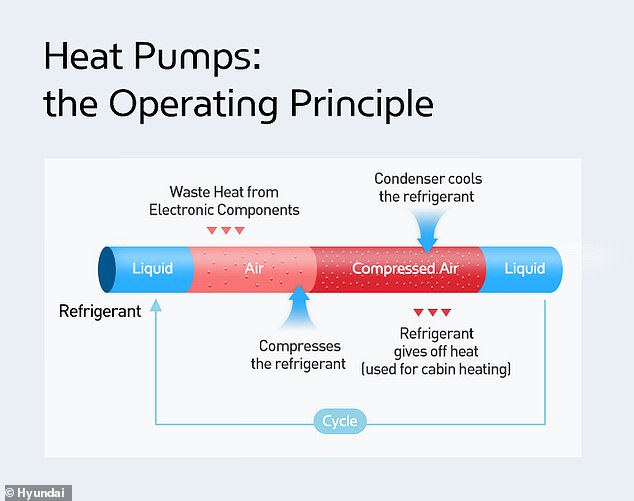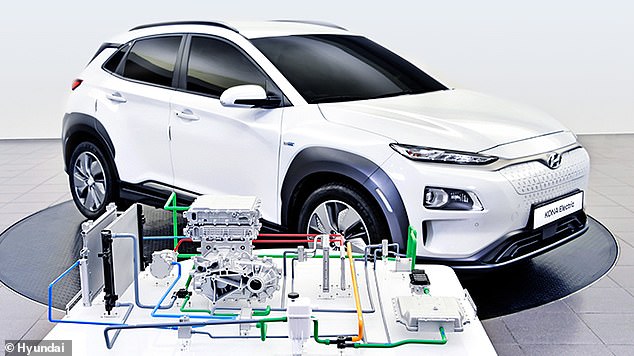Table of Contents
Type “heat pumps” into an Internet search engine and you’ll get thousands of results dedicated to weighing the pros and cons of energy-efficient home heating systems.
But many people don’t know that there is another heat pump, and it is for electric cars.
Lesser-known electric vehicle heat pumps are devices that keep you warm while extending your car’s range.
Heat pumps in electric cars have been around since the 2013 Nissan Leaf and the 2014 Kia Soul. But more recently it has been the Teslas that have drawn the most attention to them.
So what exactly do EV heat pumps do and how do they work? How much money can they save you?
Here’s our guide to heat pumps for electric cars, which cars already come with them and whether it’s worth purchasing one as an optional extra.
What is a heat pump for electric vehicles? And how does the around £1,000 device, which many new EVs come as standard, help extend range? Here are the answers to all your heat pump questions.
What are heat pumps for electric cars and how do they work?
An electric car heat pump is a device that uses waste heat from the car battery to heat the interior of the electric vehicle and in doing so improves the efficiency of the electric vehicle by consuming less battery charge.
The common analogy for how a heat pump works is that it is like a refrigerator or freezer in reverse.
A heat pump, as the name on the tin suggests, pumps out heat. While a refrigerator moves hot air from inside to outside, a heat pump moves heat from outside to inside.
In seconds, a heat pump will take excess heat from the car’s battery and electrical system and, through compression, heat air which will then be used to heat the electric vehicle’s cabin.

A heat pump works like a reverse refrigerator or freezer, using waste heat from an electric vehicle’s battery and electrical systems to then heat the cabin and save energy.
How efficient are heat pumps for electric vehicles? And do they really help expand the reach?
A heat pump will greatly help improve a car’s efficiency in cold climates, warming the cabin faster and with less energy than a traditional fan heater or air conditioning system.
The more efficient the car is, the more kilometers of range it can travel, since less energy will be consumed from the battery.
A real-world winter range test by What Car? It found that electric cars equipped with a heat pump fell short of their official range by an average of 25.4 percent, while those without it fell short by 33.6 percent.
Cars with heat pumps also proved to be more efficient, averaging 3.2 miles/kWh, compared to 2.9 miles/kWh for those without.
Other benefits of a heat pump?
Heat pumps are also used to keep the battery at an optimal temperature.
Batteries have complex chemistry that performs worse in cold climates, so a heat pump can step in and keep the battery at the right temperature to allow for better performance and, in particular, better charging.
Heat pumps can also run in reverse if the temperature is too high for optimal battery performance.
When you set your electric car to “preconditioning,” the heat pump preconditions the battery this way, before driving or before a charging session.

A heat pump also keeps the battery at the optimal temperature for maximum efficiency and allows for better, faster charging.
Remote programming of a heat pump for electric vehicles
Today, almost all new electric vehicles come with smartphone apps that allow you to remotely set your heat pump and precondition the car’s cabin to the perfect temperature, or let the car defrost while it’s still charging. , which also helps preserve autonomy.
It also means you can stay warm inside before getting into an equally warm car.
Do heat pumps work in all temperatures?
Yes, they do, so you don’t need to live in a country with sub-zero temperatures to benefit – wet, cold and miserable Blighty is perfect for EV heat pumps.
Do all electric vehicles come with heat pumps? How much does it cost to get one?
A lot of newer EVs come with heat pumps, but not all.
Luxury brands like BMW and Tesla offer heat pumps as standard on all their electric cars, as do some more affordable brands like Renault.
However, many brands do not offer them as standard, such as Audi, Skoda and Volkswagen, and you will have to purchase one as an optional extra.
Heat pumps usually cost around £1,000 to add as an optional extra, but many higher trim specs will include one even if the base spec doesn’t, so it’s worth checking if you’re debating between trims.
Is a heat pump worth it?

Heat pumps are a very useful device to extend autonomy in cold climates, but it is not necessary to live in subzero climates for them to be effective.
While over £1,000 is a significant additional expense, it is one of the most worthwhile extras and much more useful in the long term than a fancy speaker system.
If you’re someone who needs to squeeze every mile of range out of your EV and frequently takes long trips, then it’s definitely worth it, especially if you’ll be using the fast charging network later.
If you travel shorter distances and charge at home, it may be less worth opting for an extra as it will take much longer to recoup the cost, but it is still very useful if the EV comes with one as standard.

Some links in this article may be affiliate links. If you click on them, we may earn a small commission. That helps us fund This Is Money and keep it free to use. We do not write articles to promote products. We do not allow any commercial relationship to affect our editorial independence.

